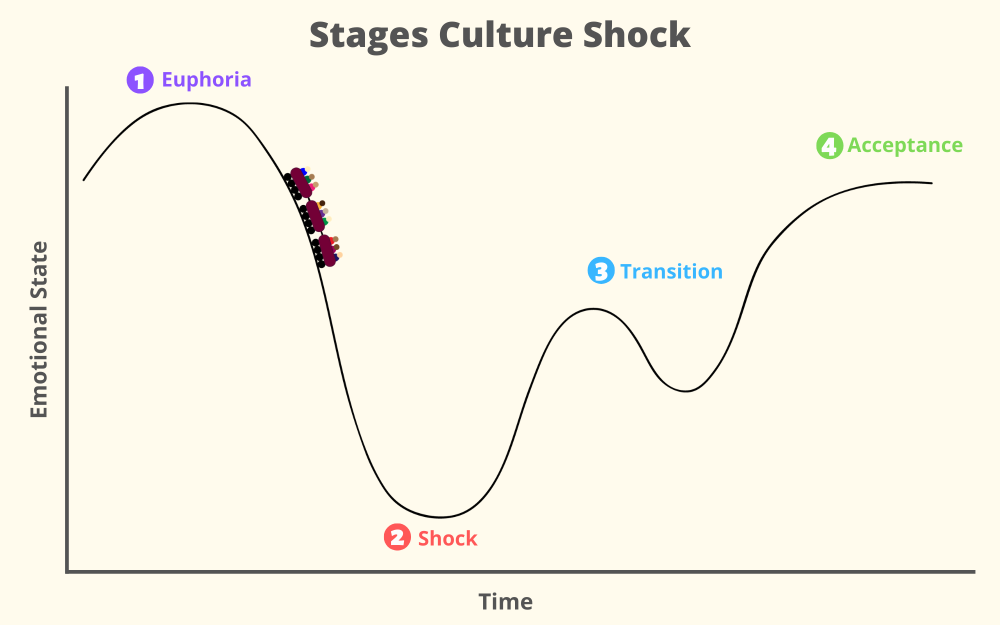Culture Stress
Culture Stress
 Culture stress, sometimes known as culture shock, is very common when relocating to a new culture and should be expected with all overseas travel. Culture stress can take on many forms, the most common being depression, irritability and homesickness. The degree to which you will suffer from culture stress will depend on how long you are gone, how prepared you are for the effects of stress and how open-minded you can remain throughout your study abroad experience. Culture stress is not derived from any one specific event or problem, but is a symptom of the psychological discomfort of encountering different lifestyles, methods of organization, and value systems that may “threaten” the model you have lived with all your life.
Culture stress, sometimes known as culture shock, is very common when relocating to a new culture and should be expected with all overseas travel. Culture stress can take on many forms, the most common being depression, irritability and homesickness. The degree to which you will suffer from culture stress will depend on how long you are gone, how prepared you are for the effects of stress and how open-minded you can remain throughout your study abroad experience. Culture stress is not derived from any one specific event or problem, but is a symptom of the psychological discomfort of encountering different lifestyles, methods of organization, and value systems that may “threaten” the model you have lived with all your life.
There are four major stages of culture. As you move through the stages, you will have “down” periods followed by “up” periods. The first downturn in your emotional level is easy to anticipate, but frequently the second downturn (which occurs after a period of resolution and happier emotions) is frequently more marked and severe. The first stage of culture stress is actually quite pleasant; it is marked by a sense of euphoria and elation. Everything is new and exciting and you will see many similarities between your culture and the host culture.

Oftentimes travelers set goals too high and expect too much of themselves, and the “let down” is inevitable. You then enter into a stage of hostility and irritability and tend to focus on the differences between cultures and view those differences negatively. You may feel the need to sleep or eat more than usual, may have difficulty controlling your temper or suffer from frequent crying spells. Whatever your symptoms are, be assured this is normal! Gradually, you will begin to feel more comfortable in your new environment and your sense of humor will return. You may fluctuate between the low and high sides of culture stress, but the lows will become less intense and less frequent until you eventually settle and adapt.

The third stage is a gradual transition when you will slowly begin to feel more comfortable in your new surroundings.
Finally, you will enter the fourth stage of culture stress, which is marked by feeling “at home” in your host culture. Students who make it to this fourth stage before leaving will find that overall they have had a good experience despite all the challenges. Often, students find that the desire to return home gradually disappears as they work through the stages of culture stress.
The best remedy for culture shock is time and perseverance. Try to keep yourself busy with activities and spend time with people you enjoy. Too much free time can lead to isolation and loneliness, and keeping busy will help you refrain from getting down and missing home. Try to make it a point to visit as many new places as you can, and you will find the experiences teach you much not only about your host country, but also about yourself AND help you ward off culture stress.
There are four major stages of culture. As you move through the stages, you will have “down” periods followed by “up” periods. The first downturn in your emotional level is easy to anticipate, but frequently the second downturn (which occurs after a period of resolution and happier emotions) is frequently more marked and severe. The first stage of culture stress is actually quite pleasant; it is marked by a sense of euphoria and elation. Everything is new and exciting and you will see many similarities between your culture and the host culture.
Oftentimes travelers set goals too high and expect too much of themselves, and the “let down” is inevitable. You then enter into a stage of hostility and irritability and tend to focus on the differences between cultures and view those differences negatively. You may feel the need to sleep or eat more than usual, may have difficulty controlling your temper or suffer from frequent crying spells. Whatever your symptoms are, be assured this is normal! Gradually, you will begin to feel more comfortable in your new environment and your sense of humor will return. You may fluctuate between the low and high sides of culture stress, but the lows will become less intense and less frequent until you eventually settle and adapt.
The third stage is a gradual transition when you will slowly begin to feel more comfortable in your new surroundings.
Finally, you will enter the fourth stage of culture stress, which is marked by feeling “at home” in your host culture. Students who make it to this fourth stage before leaving will find that overall they have had a good experience despite all the challenges. Often, students find that the desire to return home gradually disappears as they work through the stages of culture stress.
The best remedy for culture shock is time and perseverance. Try to keep yourself busy with activities and spend time with people you enjoy. Too much free time can lead to isolation and loneliness, and keeping busy will help you refrain from getting down and missing home. Try to make it a point to visit as many new places as you can, and you will find the experiences teach you much not only about your host country, but also about yourself AND help you ward off culture stress.
